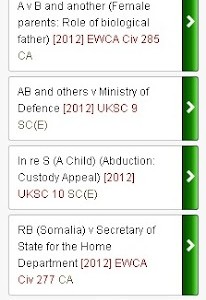Open justice – or least said soonest mended?
We expect our judges to state their opinions in public – when giving judgment in open court. But in a week in which two senior judges have spoken outside court about the dangers of, er, judges speaking outside court, we should perhaps reflect on the other side of the same coin: the dangers of not… Continue reading
We expect our judges to state their opinions in public – when giving judgment in open court. But in a week in which two senior judges have spoken outside court about the dangers of, er, judges speaking outside court, we should perhaps reflect on the other side of the same coin: the dangers of not being heard, in full, inside the court.
As you will no doubt be aware, if you visit our home page, ICLR publishes a daily update of recent decisions which change or clarify the law. We don’t report every judgment because that’s not our mission: we only report the cases that matter. But as you will see from this list, as it appeared one day last week, by an odd but not unusual concatenation of circumstances, EVERY SINGLE CASE was anonymised:

This is not to say that the cases could not be reported, or that the principles of law which they established could not be recorded for posterity — and for the better study, practice and administration of justice. But facts have been suppressed. Identities have been concealed. There has been a diminution of the openness upon which the principle of public justice rests.
Judges are public servants and the judiciary is answerable to the public. If you read old law reports, you will notice how terse the judgments often are, and how necessary and useful are the accounts given by the reporter of the background facts, procedural history and counsel’s argument (often punctuated by interjections from the bench) in helping the reader to understand the issues in the case. These days, judges are encouraged to give a much fuller account of the case, and of their reasoning, before setting out their conclusions. This is a service which benefits not just the parties in the case but the whole administration of justice. It helps concentrate the judicial mind, and ensures that justice is not only done but seen to be done.
A year ago, on 16 March 2011, Lord Neuberger MR gave a speech entitled OPEN JUSTICE UNBOUND? He gave it as the Judicial Studies Board Annual Lecture 2011 and in it he exhorted judges to ensure that their judgments were clear, concise and, above all, “accessible”:
Brevity is important, but clarity is more important, and, as the law, reflecting society as well as legislation, becomes ever more complicated, the duty of judges to communicate the law through their judgments as clearly as possible becomes ever more important.”
The Judicial Studies Board is now the Judicial College; and Lord Neuberger MR has given another speech, a presidential address to the Holdsworth Society, WHERE ANGELS FEAR TO TREAD, in which (crudely boiled down) he has said that while judges should make their judgments accessible, they should not necessarily make themselves accessible. He urged the greatest caution against speaking extra-judicially:
Judges should obviously be very cautious about publicly discussing the controversies of the day when speaking extra-judicially. Cautious not only in the choice of subject, but also in the manner in which their contributions to public debate are phrased.”
He quoted Lord Kilmuir who, over half a century ago (in 1955), had been asked for guidance on this subject, and who had said:
So long as a judge keeps silent his reputation for wisdom and impartiality remains unassailable: but every utterance which he makes in public, except in the course of the actual performance of his judicial duties, must necessarily bring him within the focus of criticism. It would, moreover, be inappropriate for the judiciary to be associated with any series of talks or anything which could be fairly interpreted as entertainment . . .”
Lord Neuberger wondered how Lord Kilmuir and his brethren (for they were all brethren in those days) would have reacted, inter alia, to the present members of the Supreme Court discussing their role, approach to work, home life and recreations on television (as they had done in a documentary broadcast by Channel 4).
As for their reaction to my colleague, Lord Justice Stanley Burnton, appearing as an amateur food critic on last week’s episode of Masterchef, the mind boggles.”
The episode of Masterchef took place at Middle Temple, in the heart of legal London, but ” senior judges giving their views on mango and passion fruit crème brulee” would have seemed outlandish to Lord Kilmuir, whose preference was for “Trappist silence” on the part of the judiciary. Lord Neuberger went on to make clear that he was not advocating a return to Kilmuir’s rules, merely that judges should exercise caution when speaking extra-judicially, particularly when commenting on (let alone criticising) Government policy, discussing matters of public controversy or anything upon which they might in due course be called upon to decide judicially.
He described as “brave” the now Lord Sumption’s recent F.A. Mann lecture, entitled Judicial Political Decision-Making: The Uncertain Boundary, in which he had “questioned the extent to which the judiciary over the past twenty years or so has seen fit to interfere with the decisions of the executive” and noted that Sir Stephen Sedley, a retired judge of the Court of Appeal, had published a detailed critique of that view in the London Review of Books. “Controversy has certainly been engaged,” Lord Neuberger noted drily. Did he think it would have been better if neither had spoken out as they did (least said soonest mended)? In another recent speech, entitled INDEPENDENCE UNDER THREAT?, Lady Justice Hallett, giving the Bentham Association Presidential Address 2012, reaffirmed the principle that “Justice, of course, must be open” and noted that Bentham himself “argued the judiciary should operate under the watchful eye of what he called the ‘Public Opinion Tribunal’.” But that did not envisage ill-informed criticism or the current rash of what Her Ladyship called “court-baiting”, such as the press or MPs under the cloak of parliamentary privilege deliberately flouting court rulings and “publishing for the sake of it material the court has ruled confidential”.
Judges are meant to be sufficiently hardy to take the criticism on the chin, shrug it off and carry on doing their job. I have no doubt that our current generation of judges will continue to do just that. However, judges are only human. If, in the future, the press and politicians cross the line more frequently and more dramatically- what effect will the drip drip drip of public criticism have?”
Essentially, then, judges should “keep calm and carry on”. They should probably not engage in extra-judicial entertainment or discuss politics or policy lest they encroach on a topic on which they may later be called upon to decide a case. But when acting judicially, in court, they have a duty to perform their function with the maximum possible openness and access. The fact that in a number of recent cases the names of parties were suppressed is not perhaps all that significant or surprising. There were probably good reasons in each case why it should have been done — to protect children, to prevent prejudicing a pending criminal trial, etc. The problem is that it is becoming increasingly frequent, and not always justified. And it is the thin end of a wedge that grows to include the suppression or redaction of other facts, then the exclusion of the public and press from the hearing, and eventually the imposition of an order (a so-called superinjunction) precluding the reporting even of the fact of there having been an order, let alone who the parties were or what the case was about.
A law reporter’s job depends on access to the court, to the hearing and to the judgment. A culture of secrecy is inimical to the common law system of precedent, in which law reporting plays such a crucial role. Any encroachment on open justice must, therefore, be clearly justified and, so far as possible, publicly explained. Whether or not judges choose to speak out extra-judicially, they should always do so, loud and clear, when acting judicially.
